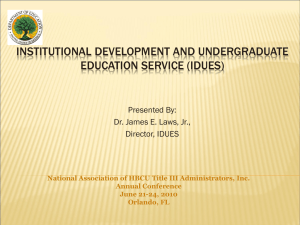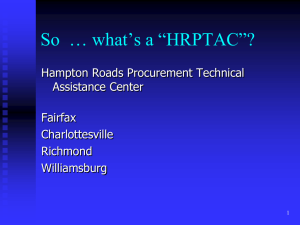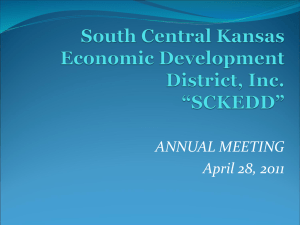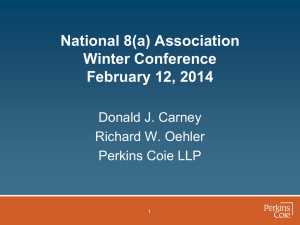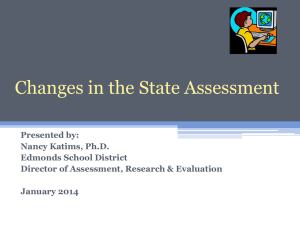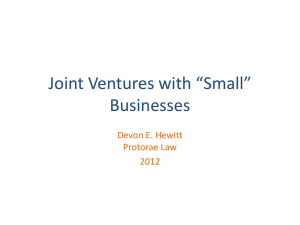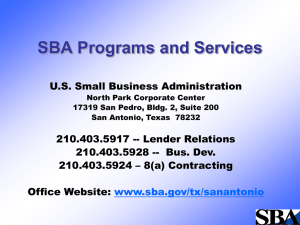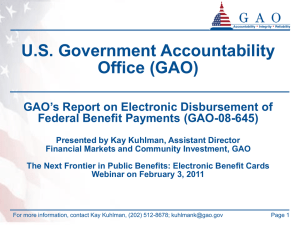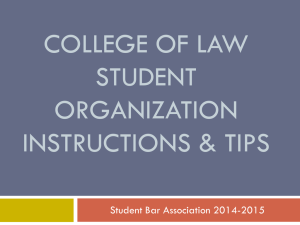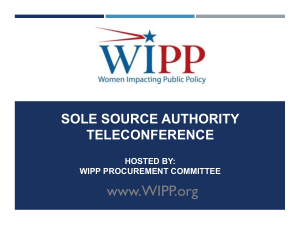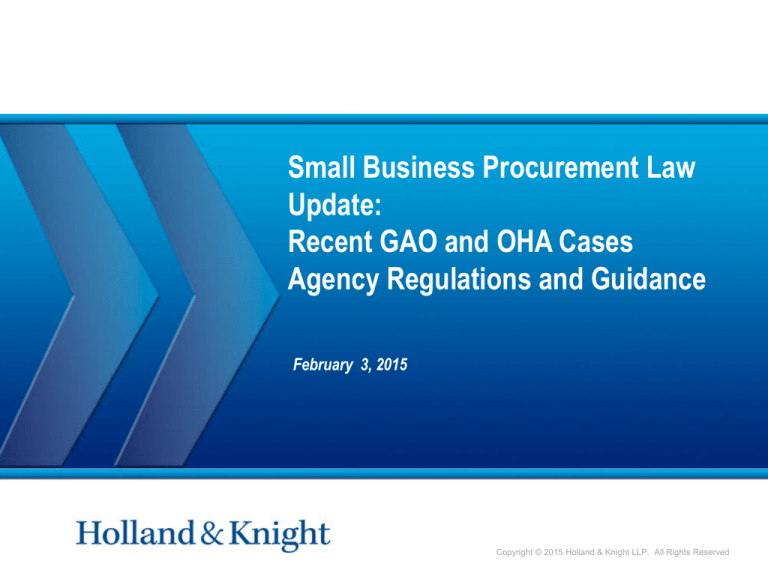
Small Business Procurement Law
Update:
Recent GAO and OHA Cases
Agency Regulations and Guidance
February 3, 2015
Copyright © 2015 Holland & Knight LLP. All Rights Reserved
GAO Cases
» Several recent small business regulations and requirements from
the 2010 JOBS Act have been addressed by GAO through its bid
protest process, including:
˗
When Task Orders can/must be set-aside under IDIQ/MAC contracts
˗
The extent to which agencies must support and document their decision to
consolidate requirements
˗
Whether a requirement is “new” and therefore not subject to the JOBS Act’s
bundling provisions
˗
Agencies’ ability/requirement to use small business set-asides for contracts to
be performed overseas
» Several recent cases address other important issues, including:
˗
When an “adverse impact” analysis is required when moving a small business
set-aside requirement into the 8(a) program
˗
What constitutes a “new requirement” for purposes of moving a requirement
out of the 8(a) program
2
The Rule of Two and Task Orders
» JOBS Act Section 1331 directed that FAR and SBA regulations be
developed addressing when agencies may, at their discretion, set aside
orders under Multiple Award Contracts
» Revisions to 13 CFR 125.2 (Oct. 2, 2013) make clear that contracting
officers have the authority to set aside task orders.
» Edmund Scientific Company, B-410179, (Nov 12, 2014): raised the
question of whether a set-aside is required when the elements of the
“Rule of Two” have been met.
» GAO’s holding: No
˗
an agency is not required to set aside task orders under a MAC contract
» GAO expressly found that the Delex case had been superseded by
Section 1331 of the JOBS Act and the revisions to the SBA’s regulations
» Takeaway: Agencies have discretion whether to set aside task orders
under MACs
3
Consolidation of Requirements
» The JOBS Act (Section 1313) requires agencies to consider the impact
of consolidation on small business by, inter alia, conducting market
research, by considering the impact on small business and making a
written determination that consolidation is “necessary and justified.”
» American Toner & Ink, et al, B-409528 (June 9, 2014): 21 protests filed
over GSA’s “OS3” office supply contract on the grounds of improper
consolidation.
» GAO held: The Agency’s decision, as set forth in an 11 page memo, was
sufficient to meet the JOBS Act’s requirements. GAO also :
˗
Held the JOBS Act’s consolidation provisions are similar to those under the
Small Business Act and CICA and GAO’s case law applying those provisions
should continue to apply
˗
Rejected Protesters’ and SBA’s arguments that more detailed, data-driven
analysis was required
» Of note: SBA’s procurement center rep “non-concurred” in the agency’s
consolidation decision, but no appeal was made by the PCR
» Query: Would the Court of Federal Claims view the issue differently?
4
When is a Requirement “New” and not subject to requirements
regarding Bundling?
» JOBS Act Section1313; FAR 2.101
» Bundling by definition is “consolidating 2 or more … requirements …
previously …performed under separate small contracts into a … single
contract.”
» Edmund Scientific Company, B-410179, (Nov 12, 2014) GAO found
˗
Certain aspects of the protested requirement were not previously performed
by small businesses and the requirement was therefore “new”
˗
As such it could not be considered a consolidated requirement
» Query: Would the Court of Federal Claims look at this issue differently?
5
Using Set-Asides in Overseas Contracts
» Maersk Line, Ltd., B-410280, (Dec 1, 2014)
» Protester challenged small business set-aside on the grounds that FAR
Part 19.000(b) states that set-asides do not apply to contracts performed
overseas.
» GAO found that the contract would be performed in the United States
and therefore the FAR part 19 set-aside requirements applied.
» SBA argued that its revised regulations state that FAR part 19 applies
“regardless of the place of performance.” 13 C.F.R. § 125.2(a); 78 Fed.
Reg. 61,114 (Oct. 2, 2013)).
˗
GAO held that it did not need to address this argument because it found the
work would be performed domestically.
˗
Appears to acknowledge that SBA’s “regardless of place of performance”
provisions could hold sway and may upend prior GAO precedent.
6
Moving Requirements into the 8(a) Program: Adverse Impact
» Recent GAO cases hold that a requirement previously performed by a
small business can be moved into the 8(a) program where:
» The incumbent no longer qualifies as a “small business”: Professional
Services Corp, B-410606 (Jan. 2015):
˗
Incumbent was found to be affiliated with its subcontractor and therefore no
longer a small business
˗
Therefore no adverse impact analysis was required
» The requirement is “new”; see Alpa Technologies and Services, Inc., B408762.2 (Feb. 12, 2014)
˗
Evidence suggested that the protested requirement was at least 25% greater
in magnitude than the previous requirement and was therefore ‘new’ under 13
CFR 124.504(c)
˗
Therefore no adverse impact analysis was required
˗
GAO also rejected protester’s argument that the SBA’s acceptance of
“consolidated” requirements violated SBA’s regulations
7
Moving Requirements out of the 8(a) Program: “New”
requirements can be moved outside the program
» SBA’s regulations provide that once a requirement is in the 8(a) program
it must remain in the 8(a) program
» That same regulation 13 CFR124.504(d) provides the rule does not
apply if there is a “new requirement” but that term (“new”) is not defined
in that particular section of the regulation
» eAlliant, B-407332.4, (Dec 23, 2014): GAO held that the definition of
“new” requirement set forth in the “adverse impact” regulation applies
when determining if a requirement can be removed from the 8(a)
program
˗
SBA concurred that it was a new requirement
˗
Potentially important for graduating/graduated 8(a)s
» See also: HRCI-MPSC PASS, LLC, B-408919, (Jan. 8, 2014)
˗
Applied a similar rationale to find a bridge contract was a “new” requirement
˗
SBA argued that the “new requirement” language applied only to “adverse
impact” determinations and was not directly applicable in cases involving
removal of work from the 8(a) program.
8
Select Recent OHA Cases of Relevance
» Manufacturing/Resellers:
˗
Sea Box, Inc. – what constitutes “manufacturing”? (consider also potential
changes to “footnote 18” regarding IT value-added resellers
» Adjusting to Labor-friendly Executive Orders:
˗
Lynxnet – hiring incumbent personnel does not evidence unusual reliance
under the ostensible subcontractor rule. (following a growing line of cases)
» Joint Ventures:
˗
Kisan-Pike – Mentor-protégé Joint Venture agreement did not meet
requirements of 124.513 and therefore parties were affiliated
» Proposal terms and Solicitation context
˗
Kaiyuh Services –
•
the Area Office objected to Appellant's use of the ronouns “we” and “our,” and to the
characterization of Appellant and ESS working as a “team,” such practices are
commonplace in Government contracting, and OHA has repeatedly held that they are
not suggestive of reliance
•
Proposal length was very short and RFP did not request information on staffing, key
personnel, etc.
9
Select Recent OHA Cases of Relevance – procedural matters
» Kisan-Pike II – District Office’s rejection of joint venture agreement is
beyond OHA’s jurisdiction
» Kaiyuh Services (Recon) -- Right to intervene expires at the close of the
record at OHA
» Engineering Logistics – Size protests must be specific – but they don’t
have to be right at the end of the day
» AIS Engineering – Task orders under long-term contracts can only be
protested if the contracting officer expressly requests recertification for
that task order
» Al Razaq – Announcement of the prospective awardee starts the clock
for size protests
» Quality Technology – receipt of a “snap shot” electronic notice identifying
prospective awardee starts the clock
» ASI-Sumo JV – Protested party bears responsibility for explaining
evidence in the record to the Area Office
» Axxon International – Respondent must present a complete Form 355
response
10
Recent SBA Guidance and Practice Pointers
» SBA Guidance on shared Business Development services
» SBA Guidance on limits on management of ANC/Tribal/NHO
subsidiaries by individuals
» Reporting Existence of Third Party and Related Party Agreements to
SBA
11
Other Recent Regulatory Changes Of Note
Recent Rule Changes now in effect:
i.
ii.
iii.
iv.
v.
June 2013 – Implementation of the Small Business and Jobs Act “Integrity
Provisions” principally through the addition of 13 CFR 121.108.
July 2013 – Small Business Subcontracting
October 2013 – MAC contracting
June 2014 – Correction to 125.6 omission in MAC rule
June 12, 2014 Interim Final Rule with Inflation Adjustment to Monetary
Based Size Standards
Recent Rules – Comments Closed, Awaiting Final Rule
i.
ii.
iii.
iv.
Advisory Small Business Size Decisions
Manufacturing NAICS Code Size Standard Review
Non-Manufacturer Rule Changes
Agent Revocation Procedures (comment period extended to February 14,
2015)
12
Questions?
Holland & Knight Offices
Portland
Boston
Chicago
San Francisco
New York
Denver
Northern Virginia
Washington, D.C.
Los Angeles
Atlanta
Dallas
Jacksonville
Austin
Tallahassee
Orlando
West Palm Beach
Mexico City,
Mexico
Tampa
Lakeland
Fort Lauderdale
Miami
Bogotá,
Colombia
Anchorage
14
Thank You
Contact
Bob Tompkins
Co-Chair, National Government
Contracts Practice
Holland & Knight, LLP
800 17th Street, NW, Ste 1100
Washington, DC 20006
Robert.Tompkins@hklaw.com
(202) 469-5111
16

